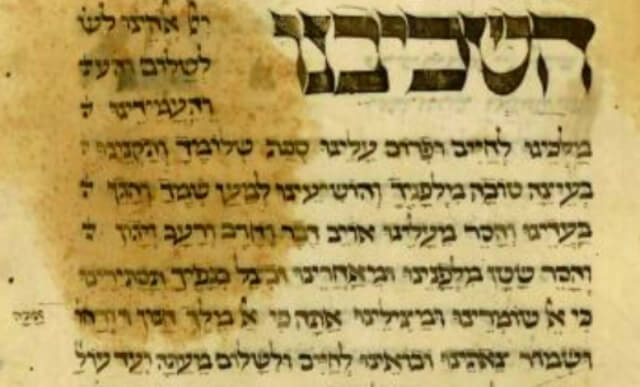
Before reciting the evening Amidah, we say the הַשְׁכִּיבֵנוּ prayer, asking God to watch over us in times of trouble:
“Save us for Your name’s sake.
Shield us and remove from us every enemy, plague, sword, famine, and sorrow.
Remove the adversary from before and behind us.
Shelter us in the shadow of Your wings...
Guard our going out and coming in; grant us life and peace, now and always.”
A beautiful, powerful prayer. But its location in the evening prayers is puzzling. We know that the Sages praised one who recites the Amidah prayer immediately after Birkat Ge'ulah (גאל ישראל), after thanking God for delivering us from Egyptian slavery. This prayer structure is called semichat ge'ulah le-tefillah.
So why is הַשְׁכִּיבֵנוּ stuck in the middle, sandwiched between Birkat Ge'ulah and the Amidah?
Expanded Redemption
The Talmud explains that הַשְׁכִּיבֵנוּ is a continuation of the blessing of redemption. They referred to this as ge'ulah arichta, “extended redemption.” Or perhaps: “expanded redemption.” We need to understand the connection between these two blessings.
An ancient tradition1 relates that הַשְׁכִּיבֵנוּ was first recited on the night of Israel’s redemption from Egypt. The Hebrew slaves feared the terrible plague killing the firstborn might also strike unworthy individuals among the Jewish people. On that terrifying night, they fervently prayed that they would be protected from every plague, sword, famine, and sorrow — the הַשְׁכִּיבֵנוּ prayer.
If so, both blessings are rooted in the Divine redemption in Egypt. The principal blessing, Birkat Ge'ulah, speaks of our collective deliverance from slavery and oppression. The shorter blessing, הַשְׁכִּיבֵנוּ, is a personal prayer beseeching God’s protection. First recited in Egypt, this private prayer extends the redemption we experienced as a nation in Egypt to all times of need. Together, these blessings comprise ge'ulah arichta.
For Rav Kook, this is a winning combination. Even when we have personal challenges and troubles, we should not ignore the needs of the collective. We still recognize the need to redeem the nation and all of humanity — Birkat Ge'ulah. The Sages stressed that we should bind together Israel’s redemption — a milestone in humanity’s advance from idolatry and superstition — to our Amidah prayer.
Yet, even as we set our sights on making the world a better place, we may not disregard our personal needs. Even those working for the benefit of the community recite הַשְׁכִּיבֵנוּ, praying for their own physical safety and spiritual welfare.
(Adapted from Ein Eyah vol. I 1:19-20 on Berachot 4; Olat Re’iyah vol. I, p. 415)
1 Commentary of the students of Rabbeinu Yonah on the Rif 2b.
Illustration image: 14th-century Machzor from Germany (New York Public Library)





